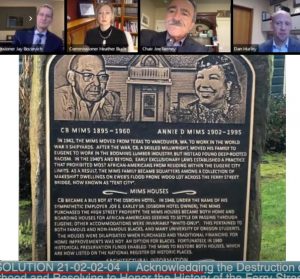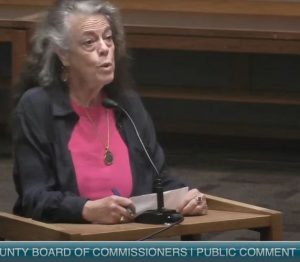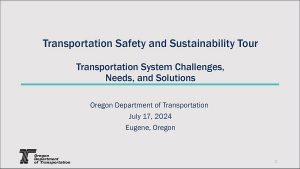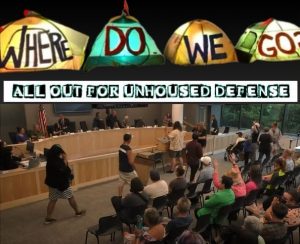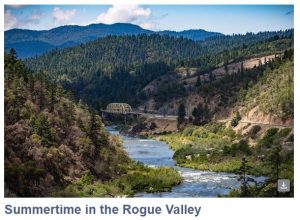City: Park rules are driving 2-hour homeless evictions
5 min read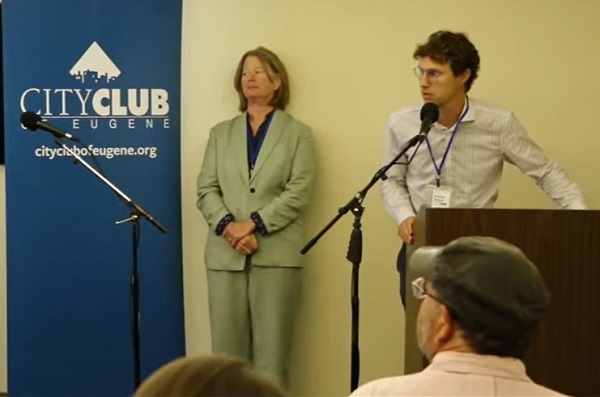
The city manager addresses the two-hour evictions: She says city park hours take precedence over state law. At the City Club June 23, Sarah Medary is questioned by Andrew Kalloch.
[00:00:11] City Club President Andrew Kalloch: My name is Andrew Kalloch and I am City Club’s president…
[00:00:14] We have a few questions from folks online (Great). One is about two-hour eviction notices being used in the city. Typically under state law, it requires 72 hours of notice for a camper. The city has been increasing, according to reports, its use of these two-hour notices. If you could tell us a little bit about what that is and maybe about why the city has been using it more regularly.
[00:00:41] Eugene City Manager Sarah Medary: Okay. The deeper we get into specific operations, I just want to make sure that I’m giving myself some grace, that there could be some lack of correctness in all that I’m saying. So I’m going to do my best.
[00:00:59] But the issue, I believe that’s being asked about, is: We do give 72-hour notices. There are existing park rules that don’t allow the building of structures. You can sleep in a city park, but you can’t camp in a city park. And it’s actually interesting, when I was in park operations, we turned lots and lots of people down that wanted to camp in parks, and like families and groups.
[00:01:28] And so here we are in 2023 and that’s still a rule that you can’t camp in parks. And so, and you can’t be in a park after it closes at 11.
[00:01:38] So the two-hour piece that I believe is being referred to is, if staff happen to be around and they see that happening, they will tell people, ‘You can’t be here. You can’t camp here. The park’s going to close.’ Or, ‘You can’t have a structure.’
[00:01:51] And we tend to give people some time. We don’t say you have to take it right this second. We may say we’ll be back in two hours. So that’s what I believe the issue is that you’re referring to.
[00:02:04] City Club President Andrew Kalloch: Just to follow up, there has been reporting that that has increased in recent years, potentially even (based on OPB report), a record last year. Is there any reason why the city would be using that more frequently now than in the past?
[00:02:16] Eugene City Manager Sarah Medary: Well, I mean, I think even just referring back to Mary (Leighton’s) comment that the numbers are 6,000 this year and were 1,000 before, there’s probably more instances.
[00:02:29] I don’t know the details of why it would be more, other than we’ve had a lot of people in our parks, and we’ve been trying to balance the needs of people using the parks for various reasons.
[00:02:43] Mary Leighton (Interfaith Food Hub coordinator): Hi, Sarah. Thanks for coming. It’s a pleasure to have you here. (Thank you.) I’m Mary Leighton, I guess I’m speaking today as a coordinator of the Interfaith Food Hub. Our client service has gone from 1,200 a month in March 2020 to 6,400 a month this last month…
[00:03:04] In the realm of the possible, how would you line up sources of policy, legal authority, and funding to allow you and your staff to meet the challenges of homelessness with compassion and practical effectiveness?
[00:03:22] City Manager Sarah Medary: …We had such a crisis happening in terms of people demanding more services for the unhoused and people demanding more services for livability in their neighborhoods and parks, that we actually set up an emergency operations incident command team, a unified command team on this topic.
[00:03:41] And they were, it was led by, our Public Works Director Matt Rodriguez and our Assistant City Manager Kristie Hammitt, and it was an all-across-the-city, full-on, one-year effort to just get more coordinated and understand how we could do this work better.
[00:03:58] At the end of that, we did a big after-action and we tried to, as best we could, make that a longer-term thing by moving people around in the organization, restructuring, and trying to create a longer-term infrastructure that held that coordinated response together.
[00:04:16] What I can tell you at the end of that is, one of my learnings over the last few years, and it is very directly to your questions, I think we have to get really clear. I think anything’s possible. Honestly, I really do.
[00:04:27] I mean, what you’re asking about around that sort of coordinated piece is possible. It’s going to take a lot of people being willing to let go of some control and let go of some ego and let go of some ideas and there’s just, everyone’s playing with a different set of rules, right?…
[00:04:50] We’re all trying to solve slightly different problems, and I think we have to get really clear about what our roles are. So in the meantime, I have come from a place of: We’re all in, we’re trying to solve this gap, we’re trying to help the people on the street, we’re setting up camps, we’re sending in outreach.
[00:05:06] We spent $17 million, almost half of our ARPA funds on this topic to a place of, ‘Wow, we have to get really clear about the city’s role in managing and protecting infrastructure and parks and livability and safety. We don’t actually have the ability and the resources or the funding stream to solve the getting-everyone-housed issue, getting everybody the mental health and behavioral health issues they need.
[00:05:34] What’s happening on the streets is so complicated…
[00:05:37] I was very hopeful coming into this legislative session that the city would actually receive some funds for some of the ongoing things we’ve set up.
[00:05:46] We’ve set about 300 new, over the last couple years, 300 new safe sleep sites for folks that have services. We thought we had a good chance of getting funding for that ongoing, but I think the state really feels like that money should still flow through the counties.
[00:06:03] And so we’re working and applying to get funds from the county to do some of that. And cities across the state are. I work with six other city managers across the state of the largest cities that aren’t Portland. And we’re all in the same boat.
[00:06:16] So I think we’re just going to have to figure out how to tweak the systems and get clear about the roles so that you can really advocate with the city on the things you need us to do more of.
[00:06:27] And you can really, you understand what we do and you understand what the county does and you understand what the state does. And I don’t think we’ve defined that very well. It’s gotten very muddy over the last couple of years.
[00:06:36] John Q: The city manager speaks at the City Club June 23. Hear the full program and support open inquiry at CityClubOfEugene.org and Eugene’s public radio station, KLCC.
